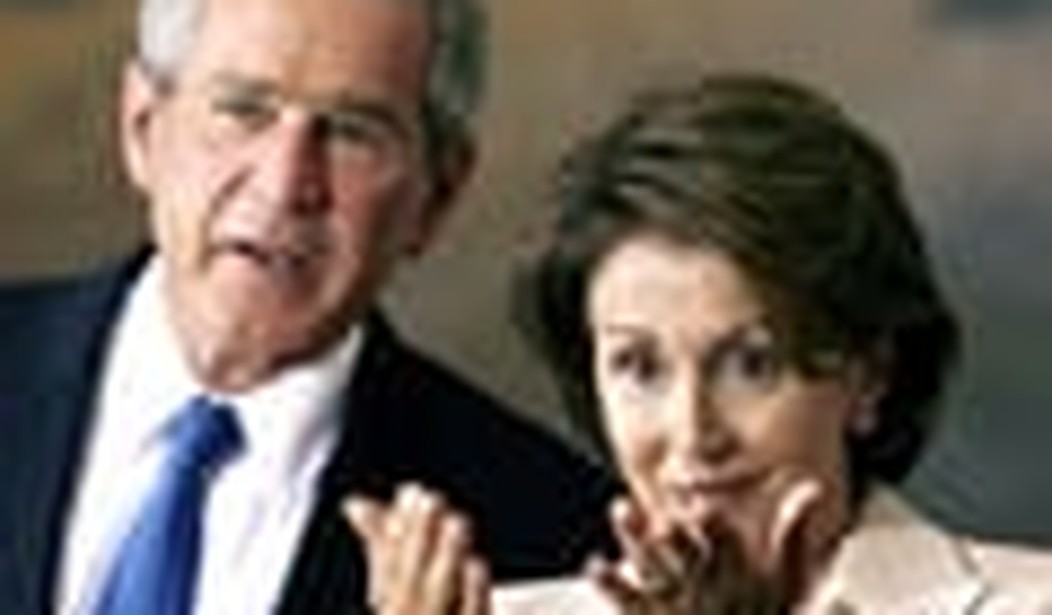Here are key full-month figures from Uncle Sam’s Daily Treasury Statement for January 31, compared to the January 2007 statement:

The decline in withholding collections is an unimportant timing difference having to do with the number of high-collection Mondays (four) compared to January 2007 (four). It’s the net amount of the other three big items (corporate and non-withheld income taxes, less refunds) that is more troubling. Their combined $68.9 billion in January 2008 is almost exactly the same as January 2007.
The message: The engine of entrepreneurship is currently on idle.
Based on the chart above, it wasn’t a surprise that, indeed, The Monthly Treasury Statement released on Tuesday showed January receipts declining by 2.1%:

Both the January and year-to-date results tell us that the dramatic supply-side driven increases in tax collections (44% in the four years ended September 30, 2007) are definitely over.
With the passage of the so-called stimulus package, it’s a virtual certainty that the reported full-year deficit (which, it should be remembered, is much lower than the real deficit, as discussed here previously; an example showing the true deficit is in the middle of this October 2006 post) will be much higher than last year’s $163 billion.
The stimulus package isn’t all bad, as noted here in late January (first item at link). But what’s really lacking is even the slightest commitment to getting the economy going again — which would, as a side effect, increase tax collections.
The economy slowed in the fourth quarter, and continues to slow, from nice levels of growth (3.8% and 4.9%) in the two previous quarters. The difficulties in the housing market and the subprime mortgage lending industry are not the only contributors. A factor that is at least as important is the fact that in 2010, a mere 23 months from now, most federal income tax rates and many other provisions of the tax law that directly or indirectly affect investor behavior will return to their 2000 and prior levels.
Unless Congress makes the current tax system permanent. What Nancy Pelosi, Harry Reid, et al. should be discussing is cutting marginal tax rates further, by perhaps 10% across the board (e.g, the top rate would come down to 31.5% from 35%, while the lowest rate would go from 10% to 9%). Dream on.
What we have is long-term investors pulling in their horns at the precise moment that we should be encouraging them to sustain their economy-growing activities. Investors know full well that key members of the current congressional majority want to raise taxes even beyond what will kick in starting 1/1/10, and that those further tax increases are a virtual certainty if a Democrat takes over the White House next year. Unless conditions change, the looming “automatic” 2010 tax increase and the prospect of additional taxes that would likely be imposed by a Democratic administration will, I believe, suppress economic growth for the foreseeable future, making a recession (which I believe we will avoid, but perhaps not by much) more likely.
Anyone waiting for another across-the-board rate cut is, unfortunately, going to be waiting a long time. Based on what he has said so far, the best we can hope for from a would-be President McCain is that he would hold the line on rates, including those put into place in 2003 on capital gains and dividends.
Somebody needs to deal with the spending side, too.
Spending in fiscal 2007 (the 12 months ended September 30, 2007) was only 2.8% higher than fiscal 2006 (see the last item at this post). Since that spending was driven by the budget passed during calendar 2006, it’s fair to say that the 109th Congress, though much-maligned, did a pretty decent job of keeping spending under control for one year. If only they hadn’t waited until then to get spending religion, because by the time they did, their perception as out-of-control spenders had been accurately planted.
The current fiscal year is off to a rocky start. Given who’s in control, should be laid at the feet of Pelosi, Reid, and President Bush. The 8%-plus increase in spending noted above is not sustainable, especially given the $100-billion plus in checks that will be going out to taxpayers in the coming months. This kind of spending increase is the kind of thing that should be driving departmental spending and hiring freezes instead of the endless calls we are hearing for new programs and expansions of existing ones.
Just as the near-doubling of tax collections that occurred during the Reagan Era was overwhelmed by out-of-control spending by Tip O’Neill and his congressional compadres, no supply-side stimulus can hope to collect enough money to keep up with spending increases of the kind seen during the past four months of this fiscal year.
Tom Blumer is a CPA based in Mason, Ohio, outside of Cincinnati. He presents personal finance-related workshops and speeches at companies, and runs BizzyBlog.com.









Join the conversation as a VIP Member